- Home
- Harlan Ellison
Angry Candy Page 9
Angry Candy Read online
Page 9
And then the water fantasy.
And then the wax fantasy.
And then the fantasy of cutting small holes in one's love partner and putting that certain part of his body — which now could be seen by Dana — in the terrible little holes.
And then the meat fantasy without laughter.
And then . . .
While he worked, while he worked fascinated, while he worked fascinated to the point of obliviousness, she began creating walls. Not bricks this time, because unlike the initial sealing-off of the horrors that she might one day wish to experience again, this was to be an enclosure from which no escape was possible.
And she bound him there with her fantasy body. No vagina dentata, no castratory pleasure of his secret self-hatred. She bound him with a muscular lock that no amount of struggling could ease. She spasmed once, a vise-grip wrench that locked together with a crushing pressure that would not permit withdrawal.
And she raised the steel walls around him, leaving him in there in a darkness with that now-discarded fantasy female who could never be used again, not even by herself.
And the only light would come from the horrors that would escape from behind the brick enclosure, for time without end, and which would eventually present themselves so bent and diseased and horrible that not even he, alien Visigoth marauder, not even he could derive joy from them.
And she left her fantasy grotto.
When the bus pulled into Philadelphia, she was the first one off. She hurried away from the station, knowing that she had lost the only secret place anyone ever really has to hide in. She had lost the ability to dream those private dreams; and what that would mean to her she could not say. Worse, she now knew what horrors she had kept entombed, knew that she was one with the rest of the human race, each member of which had grotesqueries beyond belief merely waiting to claw their way out from behind insufficient brickwork.
She was not sure she could bear to be Dana, knowing what had always lived, breathing deeply, behind those walls.
But she also knew that this animal would never walk the streets again.
When the bus was emptied, one passenger would still be sitting there, hollow-eyed and with a recognizable expression of demented agony on his face. And no matter where they took him, from that bus and from that station, no matter where they took things that had once been human and were now vegetables . . . no matter where that final passenger came to rest, he would spend the number of his days locked away from the real world where he could do harm.
He, like Dana, would spend his days and nights alone.
The difference was only broken glass.
LIGHTNING WAS DRAWN to the spot. Season after season, August to November, but most heavily in September, the jagged killing bolts sought out George Gibree's orchard.
Gibree, a farmer with four acres of scabrous apple trees whose steadily diminishing production of fruit would drive him, one year later, to cut his throat with a rabbit-skinning knife and to bleed to death in the loft of his barn in Chepachet, near Providence, Rhode Island, that George Gibree found the dismal creature at the northeast corner of his property late in September. In the season of killing bolts.
The obscenely crippled trees — scarred black as if by fireblight — had withstood one attack after another; splintering a little more each year; withering a little more each year; dying a little more each year. The Mclntoshes they produced, hideous and wrinkled as thalidomide babies. Night after night the lightning, drawn to the spot, cracked and thrashed, until one night, as though weary of the cosmic game, a monstrous forked bolt, sizzling with power, uncovered the creature's graveplace.
When he went out to inspect the orchard the next morning, holding back the tears till he was well out of sight of Emma and the house, George Gibree looked down into the crater and saw it stretched out on its back, its single green eye with the two pupils glowing terribly in the morning sunlight, its left forearm — bent up at the elbow — seeming to clutch with spread fingers at the morning air. It was as if the thing had been struck by the sky's fury as it was trying to dig itself out.
For just a moment as he stared down into the pit, George Gibree felt as if the ganglia mooring his brain were being ripped loose. His head began to tremble on his neck . . . and he wrenched his gaze from the impossible titan, stretched out, filling the thirty-foot-long pit.
In the orchard there could be heard the sounds of insects, a few birds, and the whimpering of George Gibree.
Children, trespassing to play in the orchard, saw it; and the word spread through town, and by stringer to a free-lance writer who did occasional human-interest pieces for the Providence Journal. She drove out to the Gibree farm and, finding it impossible to speak to George Gibree, who sat in a straight-back chair, staring out the window without speaking or even acknowledging her presence, managed to cajole Emma Gibree into letting her wander out to the orchard alone.
The item was small when published, but it was the beginning of October and the world was quiet. The item received interested attention.
By the time a team of graduate students in anthropology arrived with their professor, pieces of the enormous being had been torn away by beasts of the field and by curious visitors. They sent one of their group back to the University of Rhode Island, in Kingston, advising him to contact the University's legal representatives, readying them for the eventual purchase of this terrifying, miraculous discovery. Clearly, it was not a hoax; this was no P. T. Barnum "Cardiff Giant," but a creature never before seen on the Earth.
And when night fell, the professor was forced to badger the most amenable of the students into staying with the thing. Coleman lanterns, down jackets, and a ministove were brought in. But by morning all three of the students had fled.
Three days later, a mere six hours before the attorneys for the University could present their offer to Emma Gibree, a rock concert entrepreneur from Providence contracted for full rights to, and ownership of, the dead giant for three thousand dollars. Emma Gibree had been unable to get her husband to speak since the morning he had stood on the lip of the grave and stared down at the one-eyed being; she was in a panic; there were doctors and hospitals in her future.
Frank Kneller, who had brought every major rock group of the past decade to the city, rented exposition space in the Providence Civic Center at a ridiculously low rate because it was only the second week in October. . . and the world was quiet. Then he assigned his public relations firm the task of making the giant a national curiosity. It was not a difficult task.
It was displayed via minicam footage on the evening news of all three major networks. Frank Kneller's flair for the dramatically staged was not wasted.
The thirty-foot humanoid, pink-skinned and with staring eye malevolently directed at the cameraman's lens, was held in loving closeup on the marble slab Kneller had had hewn by a local monument contractor.
Pilbeam of Yale came, and Johanson of the Cleveland Museum of Natural History, and both the Leakeys, and Taylor of Riverside came with Hans Seuss from the University of California at La Jolla. They all said it was genuine. But they could not say where the thing had come from. It was, however, native to the planet: thirty feet in height, Cyclopean, as hard as rhinoceros horn . . . but human. And they all noticed one more thing.
The chest, just over the place where the heart lay, was hideously scarred. As though centurions had jammed their pikes again and again into the flesh when this abomination had been crucified. Terrible weals, puckered skin still angrily crimson against the gentle pink of the otherwise unmarred body.
Unmarred, that is, but for the places where the curious had used their nail files and penknives to gouge out souvenirs.
And then Frank Kneller made them go away, shaking their heads in wonder, mad to take the creature back to their laboratories for private study, but thwarted by Kneller's clear and unshakable ownership. And when the last of them had departed, and the view of the Cyclops on its slab could be found in magazines and newspape
rs and even on posters, then Frank Kneller set up his exposition at the Civic Center.
There, within sight of the Rhode Island State House, atop whose dome stands the twelve-foot-high, gold-leafed statue of the Independent Man.
The curious came by the thousands to line up and pay their three dollars a head, so they could file past the dead colossus, blazoned on life-sized thirty-foot-high posters festooning the outer walls of the Civic Center as The 9th Wonder of the World! (Ninth, reasoned Frank Kneller with a flash of wit and a sense of history uncommon to popularizers and entrepreneurs, because King Kong had been the Eighth.) It was a gracious hommage that did not go unnoticed by fans of the cinematically horrific; and the gesture garnered for Kneller an acceptance he might not have otherwise known from the cognoscenti.
And there was an almost symphonic correctness to the titan's having been unearthed in Providence, in Rhode Island, in that Yankee state so uncharacteristic of New England; that situs founded by Roger Williams for "those distressed for cause of conscience" and historically identified with independence of thought and freedom of religion; that locale where the odd and the bizarre melded with the mundane: Poe had lived there, and Lovecraft; and they had had strange visions, terrible dreams that had been recorded, that had influenced the course of literature; the moral ownership of the city by the modern coven known as the Mafia; these, and uncountable reports of bizarre happenings, sightings, gatherings, beliefs that made it seem the Providence Journal was an appendix to the writings of Charles Fort. . . provided a free-floating ambience of the peculiar.
The lines never seemed to grow shorter. The crowds came by the busloads, renting cassette players with background information spoken by a man who had played the lead in a television series dealing with the occult. Schoolchildren were herded past the staring green eye in gaggles; teenagers whose senses had been dulled by horror movies came in knots of five and ten; young lovers needing to share stopped and wondered; elderly citizens from whose lives had been leached all wonder smiled and pointed and clucked their tongues; skeptics and cynics and professional debunkers stood frozen in disbelief and came away bewildered.
Frank Kneller found himself involved in a way he had never experienced before, not even with the most artistically rewarding groups he had booked. He went to bed each night exhausted, but uplifted. And he awoke each day feeling his time was being well-spent. When he spoke of the feeling to his oldest friend, his accountant, with whom he had shared lodgings during college days, he was rewarded with the word ennobled. When he dwelled on the word, he came to agree.
Showing the monstrosity was important.
He wished with all his heart to know the reason. The single sound that echoed most often through the verdant glade of his thoughts was: why?
"I understand you've taken to sleeping in the rotunda where the giant is on display?" The host of the late-night television talk show was leaning forward. The ash on his cigarette was growing to the point where it would drop on his sharply creased slacks. He didn't notice.
Kneller nodded. "Yes, that's true."
"Why?"
"Why is a question I've been asking myself ever since I bought the great man and started letting people see him . . . "
"Well, let's be honest about it," the interviewer said. "You don't let people see the giant. . . you charge them for the privilege. You're showing an attraction, after all. It's not purely an humanitarian act."
Kneller pursed his lips and acceded. "That's right, that's very true. But I'll tell you, if I had the wherewithal, I'd do it free of charge. I don't, of course, so I charge what it costs me to rent space at the Civic Center. That much; no more."
The interviewer gave him a sly smile. "Come on . . ."
"No, really, honest to God, I mean it," Frank said quickly. "It's been eleven months, and I can't begin to tell you how many hundreds of thousands of people have come to see the great man; maybe a million or more; I don't know. And everybody who comes goes away feeling a little bit better, a little more important . . . "
"A religious experience?" The interviewer did not smile.
Frank shrugged. "No, what I'm saying is that people feel ennobled in the presence of the great man."
"You keep calling the giant 'the great man.' Strange phrase. Why?"
"Seems right, that's all."
"But you still haven't told me why you sleep there in the place where he's on display every day."
Frank Kneller looked straight into the eyes of the interviewer, who had to live in New York City every day and so might not understand what peace of mind was all about, and he said, "I like the feeling. I feel as if I'm worth the trouble it took to create me. And I don't want to be away from it too long. So I set up a bed in there. It may sound freaky to you, but . . . "
But if he had not been compelled to center his life around the immobile figure on the marble slab, then Frank Kneller would not have been there the night the destroyer came.
Moonlight flooded the rotunda through the enormous skylights of the central display areas.
Kneller lay on his back, hands behind his head, as usual finding sleep a long way off, yet at peace with himself, in the presence of the great man.
The titan lay on his marble slab, tilted against the far wall, thirty feet high, his face now cloaked in shadows. Kneller needed no light. He knew the single great eye was open, the twin pupils staring straight ahead. They had become companions, the man and the giant. And, as usual, Frank saw something that none of the thousands who had passed before the colossus had ever seen. In the darkness up there near the ceiling, the scars covering the chest of the giant glowed faintly, like amber plankton or the minuscule creatures that cling to limestone walls in the deepest caverns of the earth. When night fell, Frank was overcome with an unbearable sadness. Wherever and however this astounding being had lived . . . in whatever way he had passed through the days and nights that had been his life . . . he had suffered something more terrible than anyone merely human could conceive. What had done such awesome damage to his flesh, and how he had regenerated even as imperfectly as this, Kneller could not begin to fathom.
But he knew the pain had been interminable, and terrible.
He lay there on his back, thinking again, as he did every night, of the life the giant had known, and what it must have been for him on this Earth.
The questions were too potent, too complex, and beyond Frank Kneller's ability even to pose properly. The titan defied the laws of nature and reason.
And the shadow of the destroyer covered the skylight of the rotunda, and the sound of a great wind rose around the Civic Center, and Frank Kneller felt a terror that was impossible to contain. Something was coming from the sky, and he knew without looking up that it was coming for the great man on the slab.
The hurricane wind shrieked past the point of audibility, vibrating in the roots of his teeth. The darkness outside seemed to fall toward the skylight, and with the final sound of enormous wings beating against the night, the destroyer splintered the shatterproof glass.
Razor-edged stalactites struck the bed, the floor, the walls; one long spear imbedded itself through the pillow where Frank's head had lain a moment before, penetrating the mattress and missing him by inches where he cowered in the darkness.
Something enormous was moving beyond the foot of the bed.
Glass lay in a scintillant carpet across the rotunda. Moonlight still shone down and illuminated the display area.
Frank Kneller looked up and saw a nightmare.
The force that had collapsed the skylight was a bird. A bird so enormous he could not catalog it in the same genus with the robin he had found outside his bedroom window when he was a child . . . the robin that had flown against the pane when sunlight had turned it to a mirror . . . the robin that had struck and fallen and lain there till he came out of the house and picked it up. Its blood had been watery, and he could feel its heart beating against his palm. It had been defenseless and weak and dying in fear, he could feel that
it was dying in fear. And Frank had rushed in to his mother, crying, and had begged her to help restore the creature to the sky. And his mother had gotten the old eyedropper that had been used to put cod-liver oil in Frank's milk when he was younger, and she had tried to get the robin to take some sugar-water.
But it had died.
Tiny, it had died in fear.
The thing in the rotunda was of that genus, but it was neither tiny nor fearful.
Like no other bird he had ever seen, like no other bird that had ever been seen, like no other bird that had ever existed. Sinbad had known such a bird, perhaps, but no other human eyes had ever beheld such a destroyer. It was gigantic. Frank Kneller could not estimate its size, because it was almost as tall as the great man, and when it made the hideous watery cawing sound and puffed out its bellows chest and jerked its wings into a billowing canopy, the pinfeathers scraped the walls of the rotunda on either side. The walls were seventy-five feet apart.
The vulture gave a hellish scream and sank its scimitar talons in the petrified flesh of the great man, its vicious beak in the chest, in the puckered area of scars that had glowed softly in the shadows.
It ripped away the flesh as hard as rhinoceros horn.
Its head came away with the beak locked around a chunk of horny flesh. Then, as Kneller watched, the flesh seemed to lose its rigidity, it softened, and blood ran off the carrion crow's killer beak. And the great man groaned.
The eye blinked.
The bird struck again, tossing gobbets of meat across the rotunda.
Frank felt his brain exploding. He could not bear to see this.
But the vulture worked at its task, ripping out the area of chest where the heart of the great man lay under the scar tissue. Frank Kneller crawled out of the shadows and stood helpless. The creature was immense. He was the robin: pitiful and tiny.
Then he saw the fire extinguisher in its brackets on the wall, and he grabbed the pillow from the bed and rushed to the compartment holding the extinguisher and he smashed the glass with the pillow protecting his hand. He wrenched the extinguisher off its moorings and rushed the black bird, yanking the handle on the extinguisher so hard the wire broke without effort. He aimed it up at the vulture just as it threw back its head to rid itself of its carrion load, and the virulent Halon 1301 mixture sprayed in a white stream over the bird's head. The mixture of fluorine, bromine, iodine, and chlorine washed the vulture, spurted into its eyes, filled its mouth. The vulture gave one last violent scream, tore its claws loose, and arced up into the darkness with a spastic beating of wings that caught Frank Kneller across the face and threw him thirty feet into a corner. He struck the wall; everything slid toward gray.

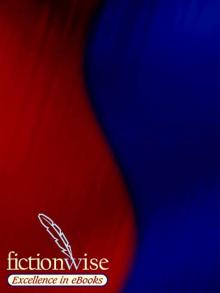 Repent, Harlequin! Said the Ticktockman
Repent, Harlequin! Said the Ticktockman Broken Glass
Broken Glass Other Glass Teat
Other Glass Teat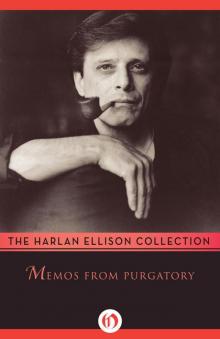 Memos From Purgatory
Memos From Purgatory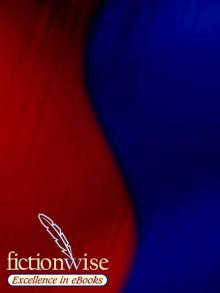 I Have No Mouth and I Must Scream
I Have No Mouth and I Must Scream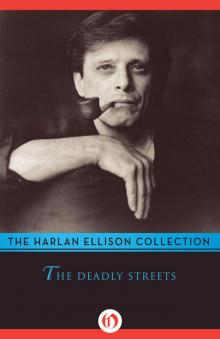 The Deadly Streets
The Deadly Streets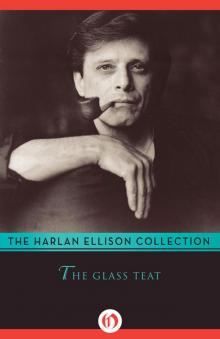 The Glass Teat
The Glass Teat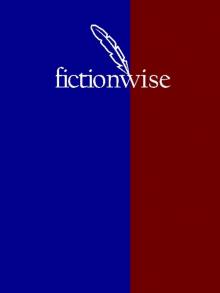 Paingod and Other Delusions
Paingod and Other Delusions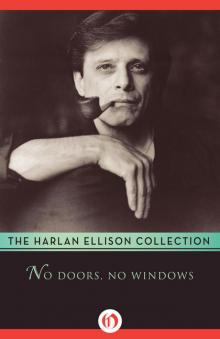 No Doors No Windows
No Doors No Windows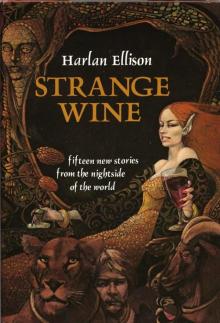 Strange Wine
Strange Wine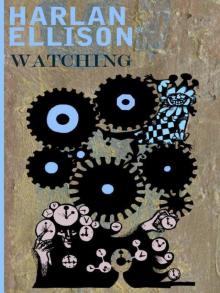 Harlan Ellison's Watching
Harlan Ellison's Watching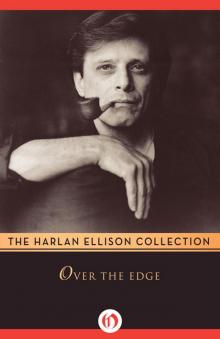 Over the Edge/An Edge in My Voice
Over the Edge/An Edge in My Voice Troublemakers: Stories by Harlan Ellison
Troublemakers: Stories by Harlan Ellison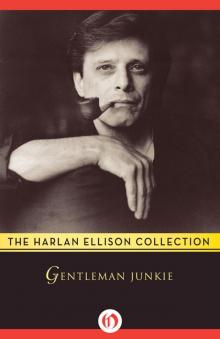 Gentleman Junkie and Other Stories of the Hung-Up Generation
Gentleman Junkie and Other Stories of the Hung-Up Generation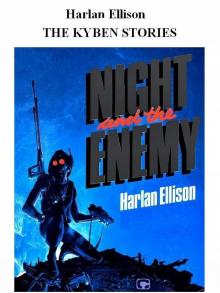 The Kyben Stories
The Kyben Stories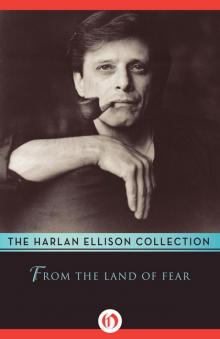 From the Land of Fear
From the Land of Fear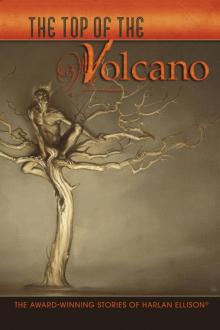 The Top of the Volcano: The Award-Winning Stories of Harlan Ellison
The Top of the Volcano: The Award-Winning Stories of Harlan Ellison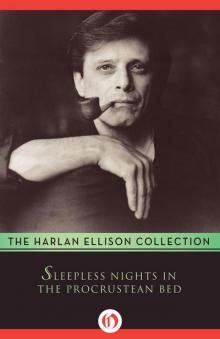 Sleepless Nights in the Procrustean Bed
Sleepless Nights in the Procrustean Bed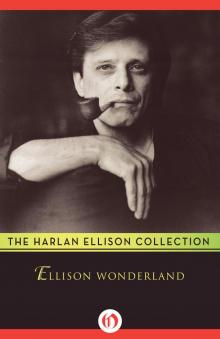 Ellison Wonderland
Ellison Wonderland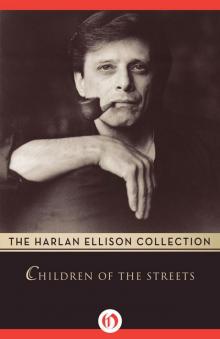 Children of the Streets
Children of the Streets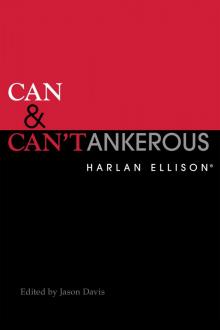 Can & Can'tankerous
Can & Can'tankerous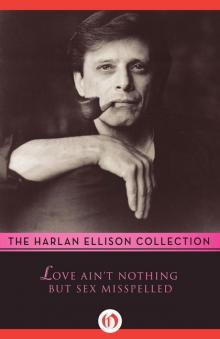 Love Ain't Nothing but Sex Misspelled
Love Ain't Nothing but Sex Misspelled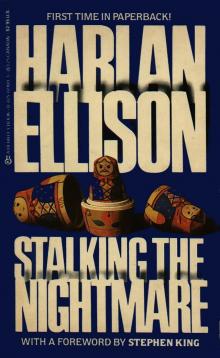 Stalking the Nightmare
Stalking the Nightmare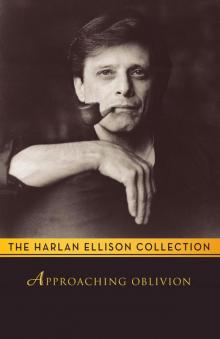 Approaching Oblivion
Approaching Oblivion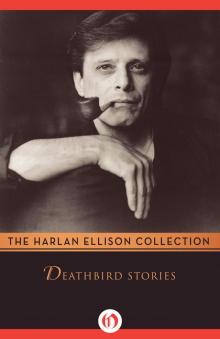 Deathbird Stories
Deathbird Stories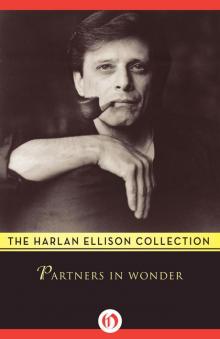 Partners in Wonder
Partners in Wonder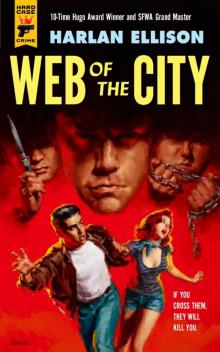 Web of the City
Web of the City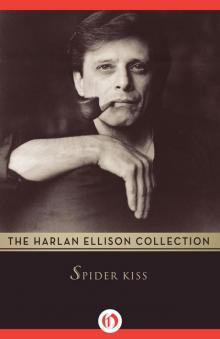 Spider Kiss
Spider Kiss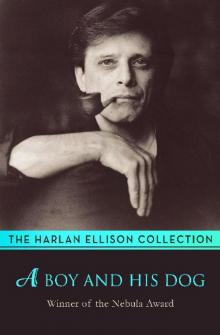 A Boy and His Dog
A Boy and His Dog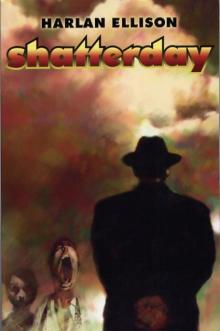 Shatterday
Shatterday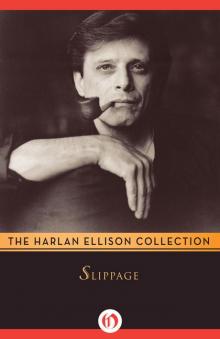 Slippage: Previously Uncollected, Precariously Poised Stories
Slippage: Previously Uncollected, Precariously Poised Stories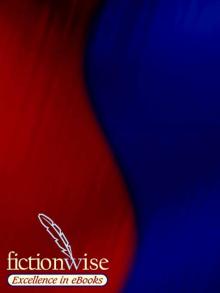 Repent, Harlequin! Said the Ticktockman
Repent, Harlequin! Said the Ticktockman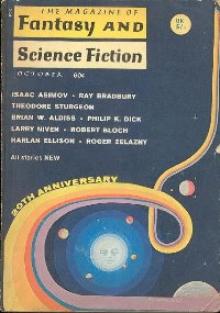 Come to Me Not in Winter's White
Come to Me Not in Winter's White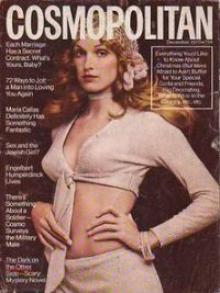 The Song the Zombie Sang
The Song the Zombie Sang The Other Glass Teat
The Other Glass Teat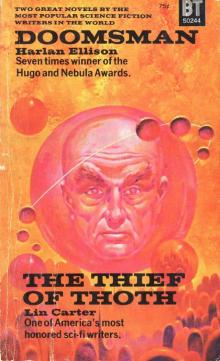 Doomsman - the Theif of Thoth
Doomsman - the Theif of Thoth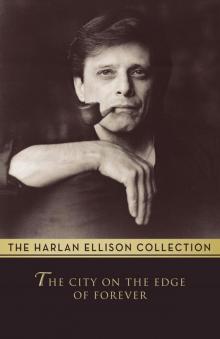 The City on the Edge of Forever
The City on the Edge of Forever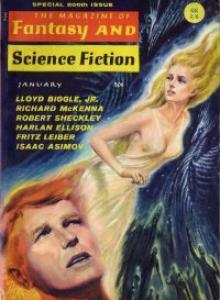 I See a Man Sitting on a Chair, and the Chair Is Biting His Leg
I See a Man Sitting on a Chair, and the Chair Is Biting His Leg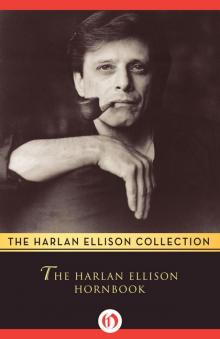 The Harlan Ellison Hornbook
The Harlan Ellison Hornbook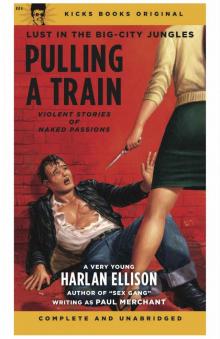 Pulling A Train
Pulling A Train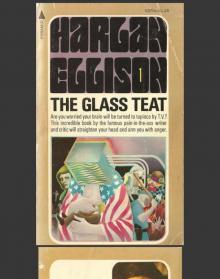 The Glass Teat - essays of opinion on the subject of television
The Glass Teat - essays of opinion on the subject of television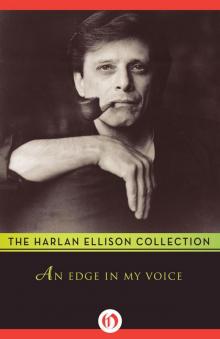 An Edge in My Voice
An Edge in My Voice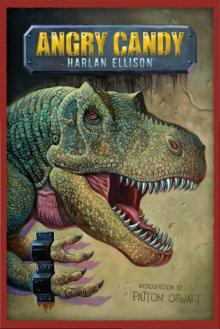 Angry Candy
Angry Candy Troublemakers
Troublemakers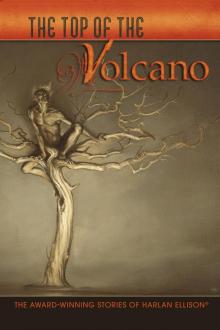 The Top of the Volcano
The Top of the Volcano Over the Edge
Over the Edge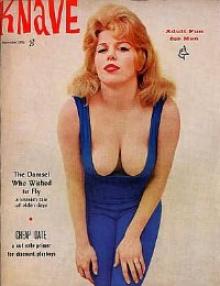 Survivor #1
Survivor #1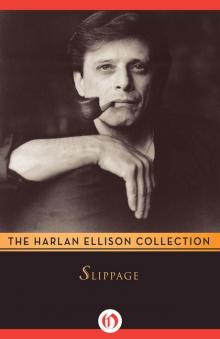 Slippage
Slippage